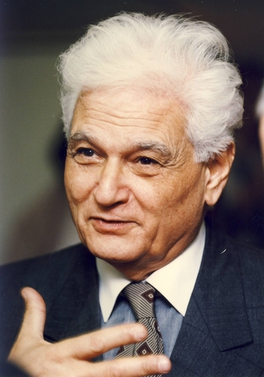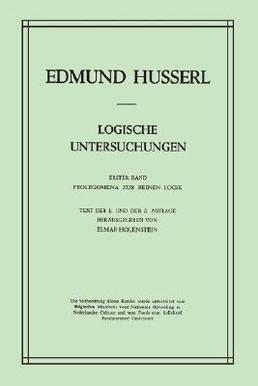
Edmund Gustav Albrecht Husserl was an Austrian-German philosopher and mathematician who established the school of phenomenology.

Martin Heidegger was a German philosopher who is best known for contributions to phenomenology, hermeneutics, and existentialism. He is often considered to be among the most important and influential philosophers of the 20th century.

Jacques Derrida was a French philosopher. He developed the philosophy of deconstruction, which he utilized in a number of his texts, and which was developed through close readings of the linguistics of Ferdinand de Saussure and Husserlian and Heideggerian phenomenology. He is one of the major figures associated with post-structuralism and postmodern philosophy although he distanced himself from post-structuralism and disowned the word "postmodernity".

Phenomenology is the philosophical study of objectivity and reality as subjectively lived and experienced. It seeks to investigate the universal features of consciousness while avoiding assumptions about the external world, aiming to describe phenomena as they appear to the subject, and to explore the meaning and significance of the lived experiences.

Emmanuel Levinas was a French philosopher of Lithuanian Jewish ancestry who is known for his work within Jewish philosophy, existentialism, and phenomenology, focusing on the relationship of ethics to metaphysics and ontology.
Continental philosophy is typically a term used as an umbrella term for philosophies prominent in continental Europe. Michael E. Rosen has ventured to identify common themes that typically characterize continental philosophy. These themes proposed by Rosen derive from a broadly Kantian thesis that knowledge, experience, and reality are bound and shaped by conditions best understood through philosophical reflection rather than exclusively empirical inquiry.
John David Caputo is an American philosopher who is the Thomas J. Watson Professor of Religion Emeritus at Syracuse University and the David R. Cook Professor of Philosophy Emeritus at Villanova University. Caputo is a major figure associated with postmodern Christianity and continental philosophy of religion, as well as the founder of the theological movement known as weak theology. Much of Caputo's work focuses on hermeneutics, phenomenology, deconstruction, and theology.
Neurophenomenology refers to a scientific research program aimed to address the hard problem of consciousness in a pragmatic way. It combines neuroscience with phenomenology in order to study experience, mind, and consciousness with an emphasis on the embodied condition of the human mind. The field is very much linked to fields such as neuropsychology, neuroanthropology and behavioral neuroscience and the study of phenomenology in psychology.
Existential phenomenology encompasses a wide range of thinkers who take up the view that philosophy must begin from experience like phenomenology, but argues for the temporality of personal existence as the framework for analysis of the human condition.

Roman Witold Ingarden was a Polish philosopher who worked in aesthetics, ontology, and phenomenology.

Jean-Luc Marion is a French philosopher and Catholic theologian. He is a former student of Jacques Derrida whose work is informed by patristic and mystical theology, phenomenology, and modern philosophy.
John Russon is a Canadian philosopher, working primarily in the tradition of Continental Philosophy. In 2006, he was named Presidential Distinguished Professor at the University of Guelph, and in 2011 he was the Shastri Indo-Canadian Institute's Canadian Lecturer to India.
The Society for Phenomenology and Existential Philosophy (SPEP) is a philosophical society whose initial purpose was to promote the study of phenomenology and existentialism but has since expanded to a wide array of contemporary philosophical pursuits, including critical theory, feminist philosophy, poststructuralism, critical race theory, and increasingly non-Eurocentric philosophies. SPEP was created in 1962 by American philosophers who were interested in Continental philosophy and were dissatisfied with the analytic dominance of the American Philosophical Association. It has since emerged as the second most important philosophical society in the United States. Alan D. Schrift and Shannon Sullivan are the current Executive Co-Directors of SPEP.

Speech and Phenomena: And Other Essays on Husserl's Theory of Signs, or Voice and Phenomenon: Introduction to the Problem of the Sign in Husserl's Phenomenology, is a book about the phenomenology of Edmund Husserl by the French philosopher Jacques Derrida, published in 1967 alongside Derrida's Of Grammatology and Writing and Difference. In Speech and Phenomena, Derrida articulates his mature relationship to Husserl, putting forward an argument concerning Husserl's phenomenological project as a whole in relation to a key distinction in Husserl's theory of language in the Logical Investigations (1900–1901) and how this distinction relates to his description of internal time consciousness. Derrida also develops key discussions of the terms deconstruction and différance. Derrida commented that Speech and Phenomena is the "essay I value the most". Derrida's best known work on Husserl's phenomenology, it is widely considered one of his most important philosophical works.
Christian Lotz is a German-American professor of philosopher at Michigan State University. Lotz's work primarily focuses on 19th and 20th Century European philosophy, continental aesthetics, critical theory, Marxism, and contemporary European political philosophy.
Renaud Barbaras is a French contemporary philosopher. An École normale supérieure de Saint-Cloud alumnus, he is Chair of Contemporary Philosophy in the University of Paris 1, Sorbonne.

The Logical Investigations is a two-volume work by the philosopher Edmund Husserl, in which the author discusses the philosophy of logic and criticizes psychologism, the view that logic is based on psychology.

Leonard "Len" Lawlor is Edwin Erle Sparks Professor of Philosophy at Pennsylvania State University. He specializes in nineteenth- and twentieth-century Continental philosophy.

Edward S. Casey is an American philosopher and university professor. He has published several volumes on phenomenology, philosophical psychology, and the philosophy of space and place. His work is widely cited in contemporary continental philosophy. He is currently Distinguished Professor Emeritus of Philosophy at Stony Brook University in New York and distinguished visiting faculty at Pacifica Graduate Institute.

Burt C. Hopkins is an American philosopher. He is an Associate Member of the University of Lille, Permanent Faculty member of the Summer School of Phenomenology and Phenomenological Philosophy, Ca' Foscari University of Venice, former Professor and Chair of Philosophy at Seattle University (1989-2016) and Permanent Secretary of the Husserl Circle.











